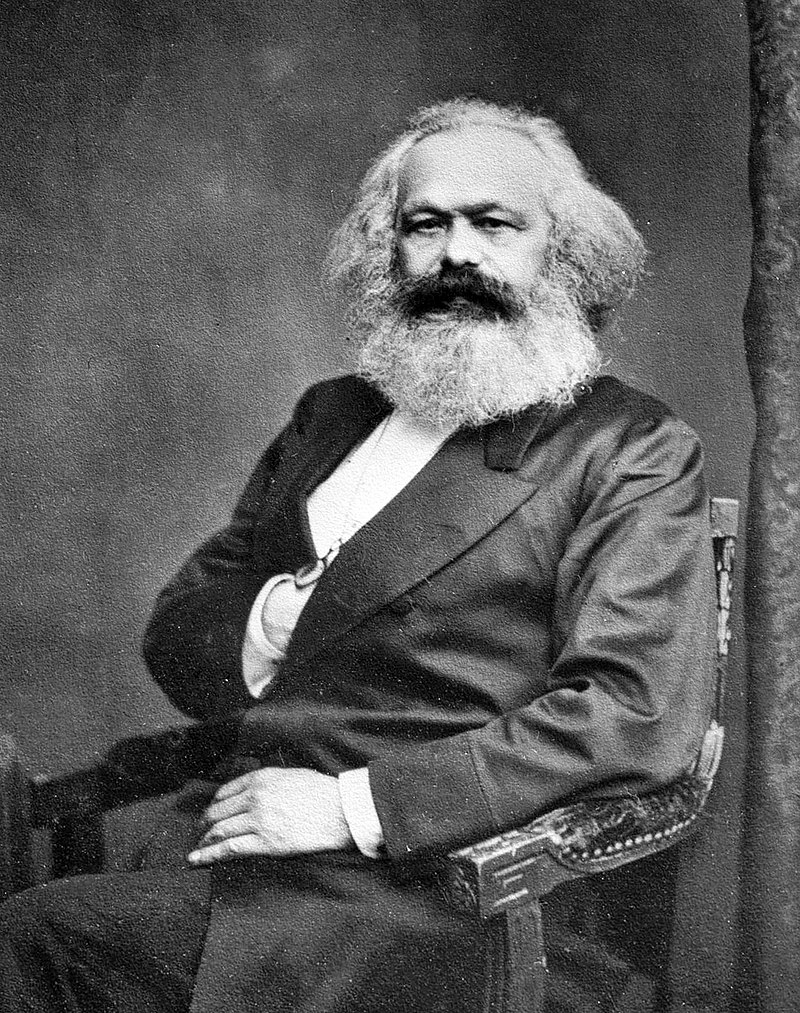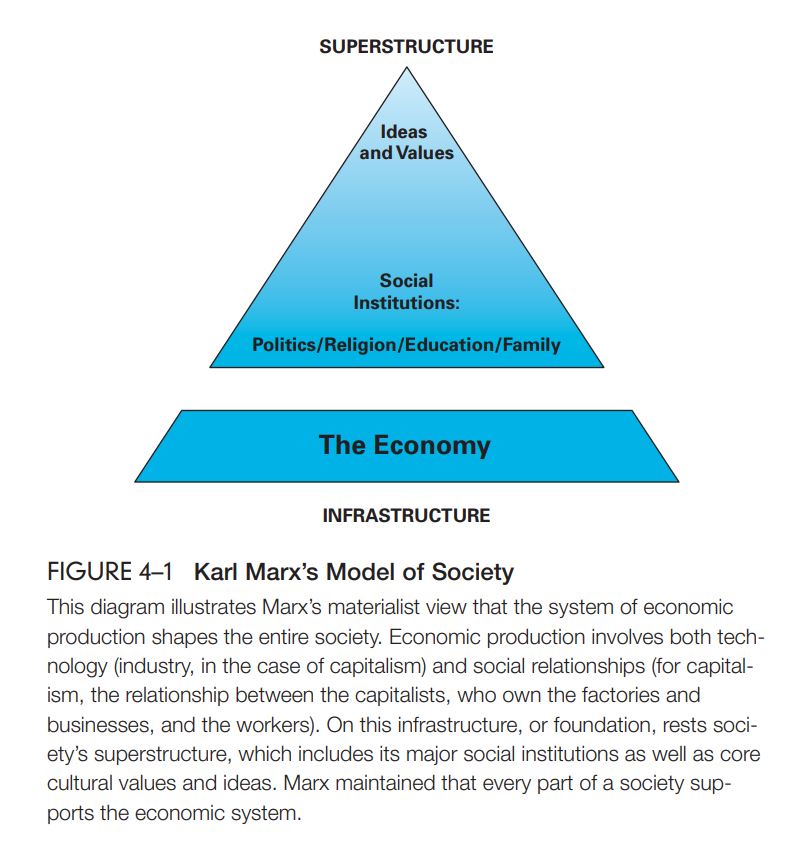Karl Marx
“The history of all previous societies has been the history of class struggles.”
Summary
- Marx was a German thinker and a sociologist
- Talked about class conflict, capitalism and its consequences
- Introduced concept of ‘Historical Materialism’ and ‘Dialectical Materialism’
- Discussed Labor and Exploitation

Introduction
- Karl Marx was a German thinker who influenced sociology to a large degree.
- Wall Street Journal, an advocate of capitalism, has called him one of the three greatest thinkers (with Sigmund Freud and Albert Einstein).
- Although Marx proposed revolution to rid the society of exploitation, he did not develop the political system ‘communism’.
Dialectical Materialism
- Dialectical Materialism is the philosophical basis of Karl Marx’s beliefs. Marx believed all that exists is matter but it is constantly in a state of motion.
- Marx was a follower of Hegel, a German philosophy, who had the belief that history moves forward by contradictions and conflict. When there are ideas that contradict each other, then they can’t co-exist.
- The dominant idea is called the thesis.
- The challenging idea is called the anti-thesis.
- When these ideas clash, a synthesis is produced which is turn becomes the thesis and then is challenged again by a new anti-thesis. This is how history moves forward through contradictions.
- In ancient Greece, there was a big debate on idealism vs. materialism. Does mind create reality or does reality create the mind?
- Most prevalent form of idealism is religion - we exist as a reflection of God. “I think, therefore I am” by Rene Descartes is another example of idealism.
- However, Marx was a follower of materialism - “I am, therefore I think”. Friedrich Engels explained it further that thought is inseparable from matter that thinks.
- Marx combined these two concepts of dialectical and materialism. Material reality moves forward through contradictions.
Society and Class Conflict
- Marx spent most of his adult life in London during the Industrial revolution. He was awed by the productive power and technology of the society but also how the riches produced by this technology only ended in the hands of a few people.
- Marx saw society in terms of a basic contradiction: in a country so rich, how could so many be poor?
- Contrary to many people’s beliefs, Marx was motivated by compassion and wanted to create a more just social order.
- Social conflict exists in many ways but Marx focused on class conflict.

Society and Production
- Marx observed that industrialization of Europe turned a small population into capitalists or the ‘bourgeoisie’.
- Capitalist: someone who tries to make profit by selling a product for more than its cost to produce.
- Capitalism turns most of the population into industrial workers or the ‘proletarians’’ who sell their labor for wages.
- To keep profits high, capitalists keep the wages low whereas the workers want higher wages. This creates conflict among the capitalists and the workers.
- Marx believed that this class conflict could only end with the end of capitalism itself.
- The social institutions that work under capitalism work to protect the capitalist’s wealth e.g. family allows capitalists to move their wealth from one generation to the next. Many people believe that private property and inheritance is natural. They believe that the rich have earned their money. Marx rejected this type of thinking calling it false consciousness.
- False Consciousness: when the individual is blamed for the shortcomings and not the society for providing enough opportunities to the individual. Marx believed false consciousness hurt people by hiding the real cause of the problems.
Conflict and History
- Marx looked through a ‘material lens’ when studying history and called it ‘Historical Materialism’. He divided human history into stages called ‘Modes of Production’:
- Primitive Communism: To Marx, early hunters and gatherers formed primitive communist societies. They didn’t have much but they shared what they had. There were no classes or inequalities in primitive communism because everyone was doing the same tasks.
- Slavery: With technological advances comes social inequality. In the ancient world, Marx said warfare was frequent and the victors turned their captives into slaves. This creation a stratification in the society: masters and their slaves.
- Feudalism: Marx believed agriculture and technology helped bring more wealth to the elite Lords but did little for the serfs who labored on the agricultural fields. He thought feudalism was simply ‘exploitation veiled by religious and political illusions’.
- Modern Capitalism: After 1800, the bourgeoisie replaced the land owning nobility as they started to control the factories, commerce and trade. To Marx, new technology helped bring the Industrial revolution and also replace the old agrarian elite with the capitalist class. Industrialization also led to the formation of the proletariat. People moved to large cities to work in factories for wages.
- Communism: The final stage where there are no classes.
Capitalism, Alienation and Consequences
- According to Marx and his collaborator, Friedrich Engels, who wrote ‘Manifesto of the Communist Party’, capitalism has two social classes: the ruling class and the oppressed class.
- The ruling class owns the productive property whereas oppressed class sell their labor for wages.
- These two classes are in a class conflict over the distribution of a society’s wealth and power.
- Marx believed that these capitalists have no loyalty and honor. They only work for their own ‘self-interests’.
- As the proletarians had no personal ties to the capitalists, Marx saw no reason for them to put up with their oppression. This could only be done by revolution.
- Revolution is only possible by the proletariat by becoming aware of their oppression and then organizing and acting together. False consciousness needed to be replaced by class consciousness.
- Class Consciousness: worker’s recognition of themselves as a class unified against capitalists and capitalism.
- Marx also saw a weakness in the capitalist class as they only work for themselves, so they won’t be able to stop the proletariats. In the long run, Marx believed capitalists would bring about their own undoing.
Alienation
- Marx thought capitalism also produced alienation: the experience of isolation and misery resulting from powerlessness.
- To the capitalists, workers are nothing more than labor - hired and fired at will. The have dehumanized and repetitive factory jobs with little satisfaction.
- Contradiction of Capitalistic Society: people develop technology to gain power over the world, the capitalist economy gains more control over the people.
- Marx stated that there were four ways in which workers become alienated:
- Alienation from the Act of Working:
- Repetitive, routine work with no input from the workers.
- Workers can’t unleash their full potential.
- Alienation from the Products of Work:
- The workers are paid less so while they make the products, they can’t afford them.
- Alienation from other Workers:
- Marx stated that people build bonds of community and companionship through work. However, capitalism promotes competition and trying to one up each other.
- Alienation from Human Potential:
- Marx argued that a worker does not fulfill himself in his work but denies himself. He has a feeling of misery rather than well-being, does not freely develop his physical and mental energies, but is physically exhausted and mentally debased. the worker, therefore, feels to be at home only during his leisure time, whereas at work, he feels homeless.
- Alienation from the Act of Working:
- In short, capitalism turns an activity that should be productive into a dull and dehumanizing experience. Marx saw alienation, in its various forms, as a barrier to social change.
Revolution
- Marx imagined a system of production that provides for the social needs of all - socialism.
- Convinced that capitalism was a social evil, he believed a revolution was necessary for change (perhaps even violent).
- Marx said, “the proletarians have nothing to lose but their chains. They have a world to win.”
Capitalism Safety Nets
- To make sure profits do not fall, capitalists use:
- Low wages
- Higher prices
- Outsourcing
- However, Marx thought crisis were inevitable when these measures failed.
Labor
- In order to make any product, two main inputs are required:
- Means of Production e.g. raw materials, tools, techniques, etc.
- Labor
- In capitalistic production, the means of production are privately owned and the products are sold in a market for profit.
- Labor is required to process the raw materials in finished goods. This increases the value of the goods and the capitalists can sell this for a profit.
- Value: A product’s value is measured by how much labor it takes to produce under normal circumstances.
- Labor is measured in time.
- Automation results in less labor so products become considerably cheaper
- “Time is money”
- Labor Theory of Value: The more time you spent in production, the more labor you are doing and the more value your product will have.
- Labor Power: The ability to labor. According to Marx, it is the most valuable commodity and it is only found in people. To sustain labor power, you need food, clothing and shelter which has value in itself. So to make more value, you need to expend value.
- The Great Contradiction: If labor is value, then why aren’t the most labor intensive products the most value?
- Theory of Surplus Value: The amount of labor you create for the employer is much more than the labor going into you. This added value is sold for a profit or surplus.
- The concept of surplus value results in exploitation in capitalism. Marx was of the opinion that capitalism thrives on exploiting the working class.
- Marx believed that the system needs to be changed from outside through government regulation and legislation.
Consequences of Capitalism
- Alienation of workers
- Automation leading to low profits
- Crisis of surplus
Cultural Marxism and Political Correctness
- Marxists –> followers of Marx
- Post-Marxism –> need to sift the good from the bad
- Leninism –> developed by Vladimir Lenin as a concept on top of Marxism. It said that rather than waiting for history to run its course, need to push it forward through a group of people called the Vanguard.
- Stalinism –> form of governance which has characteristics of state violence, rapid industrialization, terrorism, socialism, meticulous planning and enforcement on how to run the political and economic spheres.
- Cultural Bolshevism –> Nazi critics used this term to identify
- Cultural Marxism –> people who left Germany for USA and were advocates of Marxism. They wanted to study social change. People in USA thought they were trying to corrupt USA values.
Beyond Capitalism
- In the 20th century, socialists waited for capitalists to die and governments to take control. However, the governments actually started to support and bail out capitalists when they were at a loss.
- To protect the rights from this adapting capitalism, however, trade unions and labor unions rose up.
- Governments tried to suppress organized labor and made more and more profits for capitalists.
- However, people were left debt-trapped at this point and any lack of confidence results in turbulence (2008 financial crisis).
Criticism
- Various thinkers have argued that a communist state would by its very nature erode the rights of its citizens due to the postulated violent revolution and dictatorship of proletariat, its collectivist nature, reliance on “the masses” rather than individuals, historical determinism and centrally planned economy.
- Anarchists have also argued that centralized communism will inevitably lead to coercion and state domination. Mikhail Bakunin believed Marxist regimes would lead to the “despotic control of the populace by a new and not at all numerous aristocracy”.
Bibliography
- Das Kapital
- The Communist Manifesto
- Critique of Hegel’s Philosophy
- The German Ideology
- Wage-Labour and Capital
